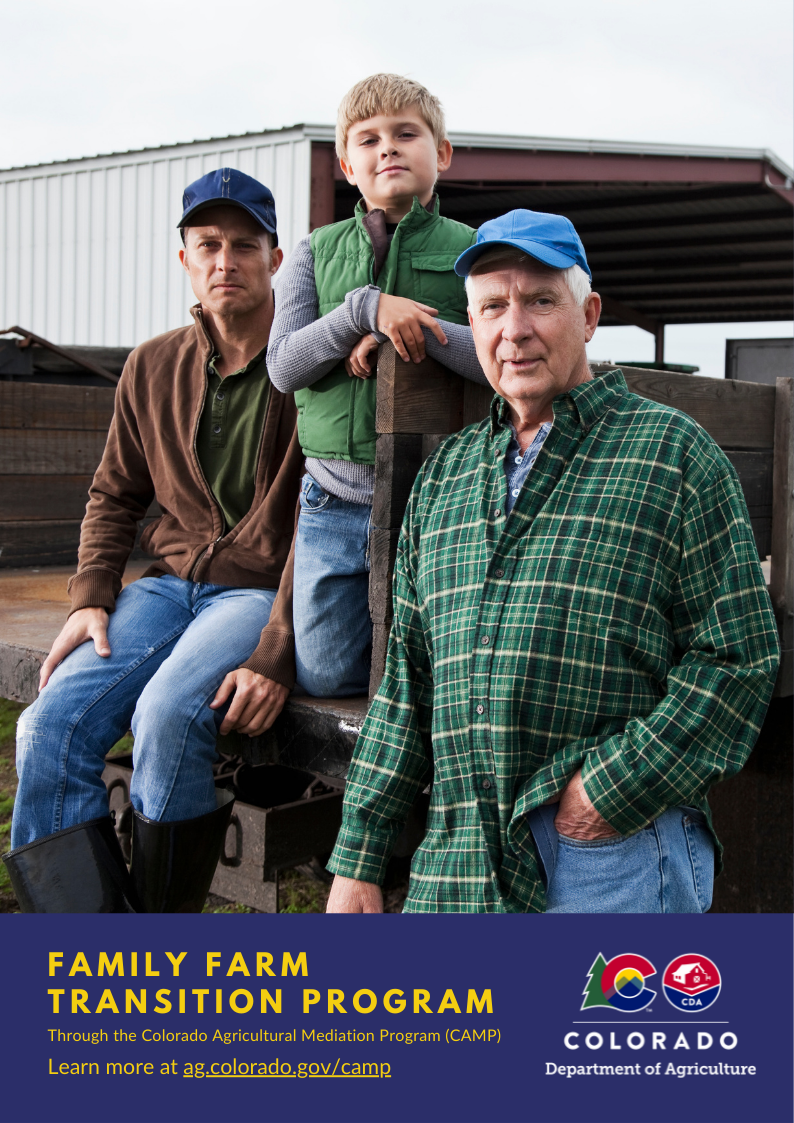Colorado Agricultural Mediation Program (CAMP)
The Colorado Agricultural Mediation Program helps farmers and ranchers who are dealing with contentious issues. The program covers agricultural loans, regardless of whether the loans are made or guaranteed by USDA or a third party, as well as the following issues:
- Wetlands determinations;
- Compliance with farm programs, conservation programs, and the National Organic Program established under the Organic Foods Production Act of 1990;
- Rural water loan programs;
- Grazing on National Forest System lands;
- Pesticides;
- Lease issues, including land leases and equipment leases;
- Family farm transition;
- Farmer-neighbor disputes;
Feel free to email me at celeta.dodge@state.co.us or call 303-869-9095 for more information on how you can get easy, affordable, and confidential mediation services.
Celeta Dodge
Program Manager

Ag Financial Crisis
Crisis can take many forms for many different people. Don't know where to start? Start Here
When a farmer or rancher is facing a crisis, it can create an emotional toll on every aspect of life. From paying bills to feeding their children, caring for the livestock and crops, retirement options, and even what they will be able to leave their heirs, the worry and anxiety can be overwhelming. The agricultural community has always come together to help our neighbors in a time of need and that is what this effort is all about pulling together to help others through this stressful time. Please reach out to the Colorado Crisis Services if you, or someone you love, is struggling.
Additional Resources:
- Man Therapy: It's ok to cry, even when it's not about sports
- Office of Suicide Prevention
- Talk Saves Lives: An Introduction to Suicide Prevention
- When Someone Is at Risk: How to talk to someone who may be struggling with depression or anxiety
- Risk Factors and Warning Signs
An effort by the Colorado Department of Agriculture, Colorado Farm Bureau, Colorado State University Extension, Rocky Mountain Farmers Union, and the Colorado Department of Human Services
Family Farm Transition
Through the Colorado Agricultural Mediation Program, CDA supports agricultural producers as they develop a family farm transition plan for the next chapter of their farm or ranch.
The 2018 Farm Bill provides a new opportunity to expand the CAMP program.
The 2018 Farm Bill added language to State Agricultural Mediation Programs, to include Family Farm Transitions to the “Issues Covered By State Mediation Programs” section. Family Farm Transition is a succession plan that outlines the steps needed to transition ownership of a family farm to the next generation. This includes estate planning, tax issues, and real property ownership.
Decisions about the long-term future of a family farm can be financially and emotionally challenging. A neutral mediator can help farm families clarify changing roles and responsibilities, agree on financial terms, and navigate difficult conversations that often are part of family farm transitions.
Benefits of the Family Farm Transition Plan:
- Support the next generation of farmers and ranchers.
- Promote and incentivize the sustainability of family farms.
You can email Celeta Dodge, Program Manager, at celeta.dodge@state.co.us or call 303-869-9095 for more information on how you can get confidential Family Farm Transition services.

FAQs
The U.S. Department of Agriculture (USDA) prohibits discrimination in all its programs and activities based on race, color, national origin, age, disability, and where applicable, sex, marital status, familial status, parental status, religion, sexual orientation, political beliefs, genetic information, reprisal, or because all or part of an individual’s income is derived from any public assistance program. (Not all prohibited bases apply to all programs.) Persons with disabilities who require alternative means for communication of program information (Braille, large print, audiotape, etc.) should contact USDA’s TARGET Center at (202) 720-2600 (voice and TDD).
To file a complaint of discrimination, write to USDA, Assistant Secretary for Civil Rights, Office of the Assistant Secretary for Civil Rights, 1400 Independence Avenue, S.W., Stop 9410, Washington, D.C. 20250-9410 or call toll-free at (866) 632-9992 (English) or (800) 877-8339 (TDD) or (866) 377-8642 (English Federal-relay) or (800) 845-6136 (Spanish Federal-relay). USDA is an equal opportunity provider and employer.
- Q: What is CAMP?
A: The Colorado Department of Agriculture established the Colorado Agricultural Mediation Program in 2002 to help farmers and ranchers who are dealing with contentious issues.
- Q: What does CAMP offer?
A:
- Provides alternative dispute resolution opportunities for Colorado agricultural borrowers and creditors.
- Provides possible dispute resolution for farmers with non-credit issues such as wetland determination, farm programs, conservation programs, National Organic Program, grazing, pesticides, lease issues, family farm transition discussions, and farmer-neighbor disputes.
- Helps Colorado farmers facing financial adversity through mediation.
- Revitalizes the economic base of rural communities.
- Family Farm Transition
- Q: Is it confidential?
A: The mediation process allows the parties to speak openly about the issues in a confidential manner. Colorado law provides, with some limitations, that meditations are confidential and privileged. None of the parties to mediation can subpoena the mediator, and nothing specific to the mediation can be admissible in any later administrative or judicial proceeding.
- Q: What is mediation?
A: Mediation is a voluntary, confidential process that helps identify issues, options, and possible solutions. It gives customers an option before resorting to litigation. As a neutral third party, the mediator does not determine who is right or wrong and only serves to facilitate open, frank discussion of the issues. A successful mediation is based on the voluntary cooperation and participation of all the parties.
- Q: Why choose mediation?
A: Most importantly, mediation maintains confidentiality, restores communication, and fosters important business relationships. It provides a neutral setting where individuals can openly discuss sensitive issues and reach acceptable solutions. The minimal cost of mediation provides an affordable alternative to litigation.
- Q: Who requests mediation?
A: Mediation usually begins after contact between agricultural producers and other parties have failed. Mediation may be initiated by either party and may include counseling and financial analysis.
- Q: What topics can be mediated?
A:
- Ag Credit Mediations. A mediation involving a credit issue may be requested by any Colorado agricultural borrower or creditor. Typical creditors include banks, suppliers, co-ops, implement dealers, Farm Credit Services, and the USDA Farm Service Agency (FSA).
- USDA Adverse Actions. Program areas include conservation or farm programs, wetland determinations, rural water loan programs, grazing on national forest lands, and pesticides.
- Q: How does mediation work?
A: Individuals with disputes have the opportunity to request mediation services. Mediation officials then assign one or more mediators to the case, and participants may accept or eliminate these mediators. Once a mediator is accepted, all potential parties are advised that mediation is underway and can participate. The mediator schedules a time and place to meet that is convenient for all parties. The process can vary from a few hours to several days, depending on the complexity of the issues.
- Q: What is the cost?
A: The fee for mediation begins at $50 per party for the first four hours and $25 per party for each additional hour. Participants are responsible for all additional legal or financial advisors.
- Q: Who should I contact?
A: Contact the Colorado Agricultural Mediation Program, if you have questions or would like additional information. The program is administered by the Colorado Department of Agriculture Farm Products Section.
Related Links
Coalition of Agricultural Mediation Programs
Colorado State University Extension Agriculture and Business Management